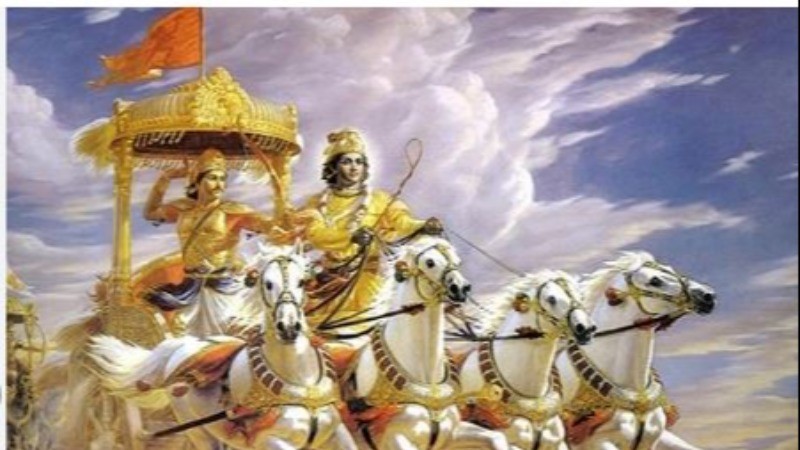
Sanatan Dharma is ever new, continuous and ever ancient. In Sanatan Dharma or Hindu Dharma, everything is done in an orderly manner. There is some reason or logic behind everything. All this is written in detail in Hindu religious scriptures. But, in today's fast-paced world, people do not get time to study Hindu religious scriptures. It can also be said that people do not want to study at all.
Some scholars of scriptures say that no matter how many reasons or excuses there are for not studying Hindu religious scriptures, one of the main reasons is Macaulay's English education system. Sanskars are very important in Hindu way of life or tradition. It has a beautiful system of sanskars from before the child is conceived to after birth and till death. Even today 16 sanskars are in practice.
When a child or person talks or behaves indecently, people say that 'he has not been taught good values' or 'he is ill-mannered'. When a child or person talks to an elder person using words like 'tu', 'tera', 'teri', 'tujhe' etc. or in a rude manner, people become uncomfortable. In fact, they even say bad things. Talking to elders using 'tu' is also called lack of culture. The question arises why is this so? What is the reason behind this that addressing elders using the word 'tu' by younger people or children is called lack of culture?
Why should we not address our elders as 'tu', 'tera/teri', tujhe etc.? An attempt has been made to answer this question on the basis of the Mahabharata composed by Maharishi Ved Vyas and written by Lord Shri Ganesha. The entire background of the answer to this question is in chapters 65-71 of the Karna Parva of the Mahabharata.
In the Mahabharata, it is said that after entrusting Bhimsen with the responsibility of the war, Shri Krishna and Arjuna go to Yudhishthira. When they come to him, Yudhishthira asks Arjuna about the story of Karna's death by mistake. Not only this, when Yudhishthira asks, Arjuna tells Yudhishthira the reason why he has not been able to kill Karna till now and vows to kill him.
Hearing this from Arjun, Yudhishthira became very angry and insulted Arjuna by saying very bad words. Speaking harsh words in anger, Yudhishthira asked Arjuna to give his Gandiva bow to Shri Krishna or to some other king (Karna Parva, Chapter 68, Verse 26-27), not only this, in verse 30, Yudhishthira scolded Arjuna and said, "Shame on this Gandiva bow of yours, shame on the valor of your arms, shame on these countless arrows of yours, shame on this flag of yours given by Hanumanji and shame on this chariot given by Agnidev".
Arjuna got very angry when Yudhishthira said this. He picked up his sword with the intention of killing Yudhishthira. Seeing his anger at that time, Lord Krishna asked Arjuna, 'Parth! What is this? How did you pick up the sword?' And scolded Arjuna a lot. On this, Arjuna tells Lord Krishna about his pledge or vow,
“Whoever amongst men tells me to give my Gandiva bow to some other man who is superior to you in knowledge of weapons or strength, then Keshav! I will kill him by force. Similarly if someone calls Bhimasena 'moustache and beardless', then he will kill him, Vrishniveer! King Yudhishthira has repeatedly told me in your presence that 'you should give your bow to someone else'” (Karna Parva, Chapter 69, Verse 62-63).
Arjun further says that if he kills Yudhishthira, he himself will not survive. After this, Arjun asks Lord Shri Krishna for a solution that will protect his vow and save the lives of both the brothers.
When Arjuna asked, Lord Krishna explained to Arjuna why Yudhishthira said harsh words. Then in the same chapter, he told Arjuna the way to protect his promise and said, "
Yada manam labhate mananaarhastada sa vaai jeevati jeevloke.
Yadavmanam labhate mahantam tada jeevnamrit ityuchyate sa. 81..
Meaning: In this world, as long as an honorable man gets respect, he is truly alive. When he starts getting great insults, then he is called dead while still alive.
Tvamityatrabhavantam hi bruhi partha yudhishthiram.
Tvamityukto hi nihato Gururbhawati Bharat. 83..
Meaning: Parth! You have always addressed Yudhishthira as 'Aap', today address him as 'Tu'. Bharat! If a teacher is addressed as 'Tu', then in the eyes of saints it is tantamount to killing him.
In the next verse, Lord Krishna told about a Shruti whose deities are Atharva and Angira.
Avadhen Vadhaah Prokto Yad Gurustvamiti Prabhu.
Tad Bruhi Tvam Yanmayoktam Dharmarajasya Dharmavit. 86..
The meaning of that shruti is- 'To call the Guru 'tu' is to kill him without killing him.' Even if you are a religious scholar, use the word 'tu' for Dharmaraj as I have told you.
After listening to the words of Lord Krishna, Arjun did the same and later felt remorseful. To get rid of this remorse, Lord Krishna told Arjun about another solution. After Arjun did so, both the brothers were reunited. The essence is that one should not address elders by saying 'tu'. Its scriptural proof is in Mahabharata. Kaliyug arrived only after Lord Krishna left the earth during Mahabharata period and this scriptural knowledge became popular in our tradition.
Amit Shah Defends Article 370 Remarks in Jharkhand Rally, Targets Congress and Opposition Leaders
Amit Shah Accuses Rahul Gandhi of Mocking Constitution with Allegedly "Fake" Copy at Jharkhand Rally